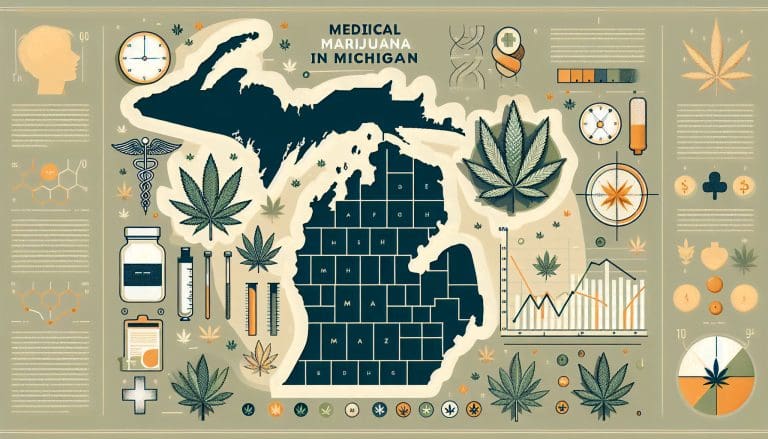Exploring Medical Marijuana Eligibility in Michigan: A Comprehensive Guide to Qualifying Conditions and Regulations
Michigan is one of the states in the U.S. that has legalized the use of medical marijuana for patients with certain qualifying conditions. This comprehensive guide aims to provide accurate and in-depth information about the eligibility criteria, qualifying conditions, and regulations surrounding the use of medical marijuana in Michigan.
Qualifying Conditions for Medical Marijuana in Michigan
According to the Michigan Medical Marihuana Act, patients must have a debilitating medical condition to qualify for a medical marijuana card. These conditions include, but are not limited to:
- Cancer
- Glaucoma
- HIV/AIDS
- Hepatitis C
- Amyotrophic Lateral Sclerosis (ALS)
- Crohn’s Disease
- Alzheimer’s Disease
Additionally, patients suffering from chronic or debilitating diseases or medical conditions that produce one or more of the following symptoms may also qualify:
- Cachexia or wasting syndrome
- Severe and chronic pain
- Nausea
- Seizures
- Severe and persistent muscle spasms
Does Michigan Add New Qualifying Conditions to its Medical Marijuana Program?
Yes, Michigan periodically reviews and adds new qualifying conditions to its medical marijuana program. The Michigan Medical Marihuana Review Panel considers petitions to add new conditions and makes recommendations based on scientific evidence and public input.
Does Michigan Allow Physicians to Recommend Medical Cannabis for Non-Qualifying Conditions?
Currently, Michigan law does not allow physicians to recommend medical cannabis for conditions not listed in the Michigan Medical Marihuana Act. However, patients can petition the state to add new conditions to the list.
Do You Need a Doctor’s Recommendation for Medical Marijuana in Michigan?
Yes, a doctor’s recommendation is required to obtain a medical marijuana card in Michigan. The recommending physician must be a Doctor of Medicine (MD) or Doctor of Osteopathic Medicine (DO) licensed in Michigan.
Who Qualifies for a Medical Marijuana Card in Michigan?
Any Michigan resident with a qualifying condition and a recommendation from a licensed physician can apply for a medical marijuana card. The patient must also be at least 18 years old. Minors can qualify under specific conditions with parental consent.
Understanding the eligibility criteria and regulations for medical marijuana in Michigan can help patients make informed decisions about their healthcare. Always consult with a healthcare professional before starting any new treatment.
How Many Medical Conditions Qualify for Medical Marijuana Treatment in Michigan?
Michigan, like many other states in the U.S., has recognized the potential benefits of medical marijuana for treating a variety of health conditions. The state has a comprehensive list of qualifying conditions for which medical marijuana can be recommended. As of 2024, there are more than 20 conditions that qualify for medical marijuana treatment in Michigan.
Qualifying Conditions for Medical Marijuana in Michigan
According to the Michigan Medical Marihuana Act, the following conditions may qualify a patient for medical marijuana treatment:
- Cancer
- Glaucoma
- HIV/AIDS
- Hepatitis C
- Amyotrophic lateral sclerosis (ALS)
- Crohn’s disease
- Alzheimer’s disease
- Post-traumatic stress disorder (PTSD)
- Chronic or debilitating diseases or medical conditions that produce one or more of the following: cachexia or wasting syndrome; severe and chronic pain; severe nausea; seizures, including those characteristic of epilepsy; or severe and persistent muscle spasms, including those characteristic of multiple sclerosis.
It’s important to note that this list is not exhaustive. The state of Michigan allows physicians to recommend medical marijuana for other conditions if they believe the patient will benefit from its use.
Adding New Qualifying Conditions
Michigan is proactive in expanding access to medical marijuana. The state regularly reviews and updates its list of qualifying conditions. In fact, in recent years, conditions such as autism, obsessive-compulsive disorder (OCD), and arthritis have been added to the list. For the most current information, patients are encouraged to visit the Michigan Medical Marihuana Act website.
Physician’s Recommendation for Medical Marijuana
In Michigan, a physician’s recommendation is required to obtain a medical marijuana card. This recommendation confirms that the patient has a qualifying condition and that the physician believes medical marijuana may alleviate the patient’s symptoms. The recommendation must be written by a physician who is licensed in the state of Michigan.
In conclusion, Michigan has a comprehensive list of qualifying conditions for medical marijuana treatment. The state is committed to expanding access to this treatment option for patients who may benefit from it. As always, patients should consult with a healthcare provider to discuss the potential benefits and risks of medical marijuana.
Qualifying Conditions for Medical Card in Michigan 2024
Michigan has been at the forefront of medical marijuana legalization in the United States. The state’s medical marijuana program, established in 2008, allows patients with certain qualifying conditions to apply for a Medical Marijuana Card. This card grants them legal access to medical marijuana for treatment purposes. As of 2024, the list of qualifying conditions has expanded, providing more patients with the opportunity to explore the potential benefits of medical cannabis.
Exploring Medical Marijuana Eligibility in Michigan: A Comprehensive Guide to Qualifying Conditions and Regulations
According to the Michigan Marijuana Regulatory Agency, the qualifying conditions for a Medical Marijuana Card in Michigan include, but are not limited to, the following:
- AIDS
- Alzheimer’s disease
- Amyotrophic Lateral Sclerosis (ALS)
- Cancer
- Crohn’s disease
- Glaucoma
- Hepatitis C
- Nail patella
- Post-traumatic stress disorder (PTSD)
- Seizures and epilepsy
- Severe and chronic pain
It’s important to note that this list is not exhaustive, and the state regularly reviews and updates the list of qualifying conditions.
Does Michigan Add New Qualifying Conditions to its Medical Marijuana Program?
Yes, Michigan periodically reviews and updates its list of qualifying conditions for medical marijuana use. The state’s Medical Marijuana Review Panel considers petitions for new conditions and makes recommendations based on scientific evidence and public input. This ensures that the program remains responsive to the evolving understanding of the therapeutic potential of cannabis.
Does Michigan Allow Physicians to Recommend Medical Cannabis for Non-Qualifying Conditions?
Michigan law allows physicians to recommend medical cannabis for conditions not listed if they believe the patient may benefit from its use. This decision is left to the discretion of the physician, who must provide written certification stating that, in their professional opinion, the patient is likely to receive therapeutic or palliative benefit from the medical use of marijuana.
Do You Need a Doctor’s Recommendation for Medical Marijuana in Michigan?
Yes, a doctor’s recommendation is required to apply for a Medical Marijuana Card in Michigan. The recommending physician must be a Doctor of Medicine (MD) or Doctor of Osteopathic Medicine (DO) licensed in Michigan. They must also have a bona fide physician-patient relationship with the patient.
Who Qualifies for a Medical Marijuana Card in Michigan?
Any Michigan resident with a qualifying condition and a recommendation from a licensed physician can apply for a Medical Marijuana Card. The patient must also be at least 18 years old. Minors can qualify under specific conditions with parental consent and proof of guardianship.
For more information on the application process and requirements, visit the Michigan Marijuana Regulatory Agency website.
Does Michigan Add New Qualifying Conditions to its Medical Marijuana Program?
Michigan, like many other states, has a medical marijuana program that allows patients with certain qualifying conditions to use cannabis for therapeutic purposes. But does the state periodically add new conditions to this list? The answer is yes. Michigan’s Department of Licensing and Regulatory Affairs (LARA) has the authority to add new conditions to the list of qualifying conditions for medical marijuana use.
Process for Adding New Conditions
According to LARA, the process for adding new conditions involves a petition process. Any Michigan resident can submit a petition to add a medical condition to the list. The petition is then reviewed by the Michigan Medical Marihuana Review Panel, which makes a recommendation to the Director of LARA. The Director then makes the final decision.
Recent Additions to the List
In recent years, several new conditions have been added to Michigan’s list of qualifying conditions for medical marijuana use. For example, in 2018, LARA added 11 new conditions, including autism, chronic pain, Parkinson’s disease, and Tourette’s syndrome. You can view the full list of qualifying conditions on the LARA website.
Future Additions
While it’s impossible to predict exactly which conditions will be added to the list in the future, it’s clear that Michigan is open to expanding access to medical marijuana for patients with a wide range of conditions. As research continues to demonstrate the therapeutic benefits of cannabis for various medical conditions, it’s likely that more conditions will be added to the list.
Conclusion
In conclusion, Michigan does add new qualifying conditions to its medical marijuana program. This is done through a petition process, and the state has shown a willingness to expand access to medical marijuana for patients with a variety of conditions. For the most up-to-date information on qualifying conditions in Michigan, visit the LARA website.
Does Michigan Allow Physicians to Recommend Medical Cannabis for Non-Qualifying Conditions?
In the state of Michigan, the use of medical marijuana is legal for patients with certain qualifying conditions. However, the question often arises: Does Michigan allow physicians to recommend medical cannabis for non-qualifying conditions? The answer is not straightforward and depends on several factors.
Understanding Michigan’s Medical Marijuana Laws
Michigan’s medical marijuana laws, as outlined in the Michigan Medical Marihuana Act (MMMA), allow physicians to recommend medical cannabis for a specific list of qualifying conditions. These conditions include cancer, glaucoma, HIV/AIDS, hepatitis C, ALS, Crohn’s disease, Alzheimer’s disease, and several others.
However, the MMMA also includes a clause that allows physicians to recommend medical cannabis for other conditions that are “severe and chronic” and for which they believe the medical use of marijuana would likely outweigh the potential health risks. This gives physicians some discretion in recommending medical cannabis for conditions not explicitly listed in the law.
Physician Discretion and Non-Qualifying Conditions
While the MMMA does provide some leeway for physicians, it’s important to note that this discretion is not unlimited. Physicians must still adhere to the guidelines set forth by the Michigan Department of Licensing and Regulatory Affairs (LARA), which require a bona fide physician-patient relationship and a full assessment of the patient’s medical history and current medical condition.
Furthermore, physicians must be able to demonstrate that the patient’s condition is severe and chronic and that the potential benefits of medical cannabis use would likely outweigh the risks. This means that while physicians can recommend medical cannabis for non-qualifying conditions, they must do so responsibly and with solid medical justification.
Conclusion
In conclusion, while Michigan’s medical marijuana laws do allow for some physician discretion in recommending medical cannabis for non-qualifying conditions, this discretion is not without limits. Physicians must still adhere to state guidelines and demonstrate a valid medical reason for their recommendation. As such, patients with non-qualifying conditions should consult with a knowledgeable and experienced medical marijuana physician to discuss their options.
For more information on Michigan’s medical marijuana laws and qualifying conditions, please refer to our other sections: Exploring Medical Marijuana Eligibility in Michigan: A Comprehensive Guide to Qualifying Conditions and Regulations, How Many Medical Conditions Qualify for Medical Marijuana Treatment in Michigan?, Qualifying Conditions for Medical Card in Michigan 2024, Does Michigan Add New Qualifying Conditions to its Medical Marijuana Program?, Do You Need a Doctor’s Recommendation for Medical Marijuana in Michigan, and Who Qualifies for a Medical Marijuana Card in Michigan?.
Do You Need a Doctor’s Recommendation for Medical Marijuana in Michigan?
In the state of Michigan, a doctor’s recommendation is indeed required to access medical marijuana. This is a crucial step in the process of obtaining a Medical Marijuana Card (MMJ Card). The recommendation serves as proof that a licensed physician has determined that you could benefit from the use of medical cannabis for your condition.
Why is a Doctor’s Recommendation Necessary?
A doctor’s recommendation is not only a legal requirement but also a medical one. It ensures that only those who could truly benefit from medical marijuana have access to it. This recommendation is based on a thorough evaluation of your medical history, current health status, and the severity of your condition. Michigan’s Marijuana Regulatory Agency oversees this process to ensure it is carried out responsibly and ethically.
How to Obtain a Doctor’s Recommendation
Obtaining a doctor’s recommendation in Michigan involves a few steps. First, you must schedule an appointment with a physician registered with the state’s medical marijuana program. During this appointment, the doctor will assess your medical condition and determine if medical marijuana could be beneficial for you. If the doctor agrees, they will provide a written recommendation that you can then use to apply for your MMJ Card.
Conditions That Qualify for a Doctor’s Recommendation
Not all medical conditions qualify for a doctor’s recommendation for medical marijuana in Michigan. The state has a specific list of qualifying conditions, which includes cancer, glaucoma, HIV/AIDS, hepatitis C, ALS, Crohn’s disease, Alzheimer’s disease, and more. You can find the full list of qualifying conditions on the Michigan Marijuana Regulatory Agency’s website.
Final Thoughts
While the process of obtaining a doctor’s recommendation for medical marijuana in Michigan may seem daunting, it is a necessary step to ensure that medical marijuana is used responsibly and effectively. With the right guidance and understanding of the process, you can navigate this journey and potentially find relief from your medical condition through the use of medical cannabis.
Remember, the use of medical marijuana should always be under the supervision of a healthcare professional to ensure safety and efficacy. Always consult with your doctor before starting any new treatment.
Who Qualifies for a Medical Marijuana Card in Michigan?
Michigan has been at the forefront of medical marijuana legalization in the United States. The state’s Medical Marihuana Act, passed in 2008, allows qualifying patients to obtain and use marijuana for medical purposes. But who exactly qualifies for a medical marijuana card in Michigan?
Qualifying Conditions
According to the Michigan Department of Licensing and Regulatory Affairs, a patient must be diagnosed with one of the following debilitating medical conditions to qualify for a medical marijuana card:
- Cancer
- Glaucoma
- HIV/AIDS
- Hepatitis C
- Amyotrophic lateral sclerosis (ALS)
- Crohn’s disease
- Alzheimer’s disease
- Post-traumatic stress disorder (PTSD)
Additionally, a patient may qualify if they suffer from a chronic or debilitating disease or medical condition that produces one or more of the following:
- Severe and chronic pain
- Severe nausea
- Seizures, including those characteristic of epilepsy
- Severe and persistent muscle spasms, including those characteristic of multiple sclerosis
Physician Recommendation
Obtaining a medical marijuana card in Michigan requires a physician’s recommendation. The recommending physician must be a Doctor of Medicine (MD) or Doctor of Osteopathic Medicine (DO) licensed in Michigan. They must also have a bona fide physician-patient relationship with the patient.
Application Process
Once a patient has a physician’s recommendation, they can apply for a medical marijuana card through the Michigan Medical Marihuana Program (MMMP). The application must include the physician’s written certification, a copy of the patient’s valid Michigan ID, and the application fee.
Adding New Qualifying Conditions
Michigan periodically reviews and adds new qualifying conditions to its medical marijuana program. The most recent additions include obsessive-compulsive disorder and arthritis. The state also allows physicians to recommend medical cannabis for non-qualifying conditions if they believe it will be beneficial for the patient.
In conclusion, Michigan’s medical marijuana program is designed to provide relief for patients with a wide range of debilitating conditions. If you believe you may qualify, consult with a licensed Michigan physician to discuss your options.








